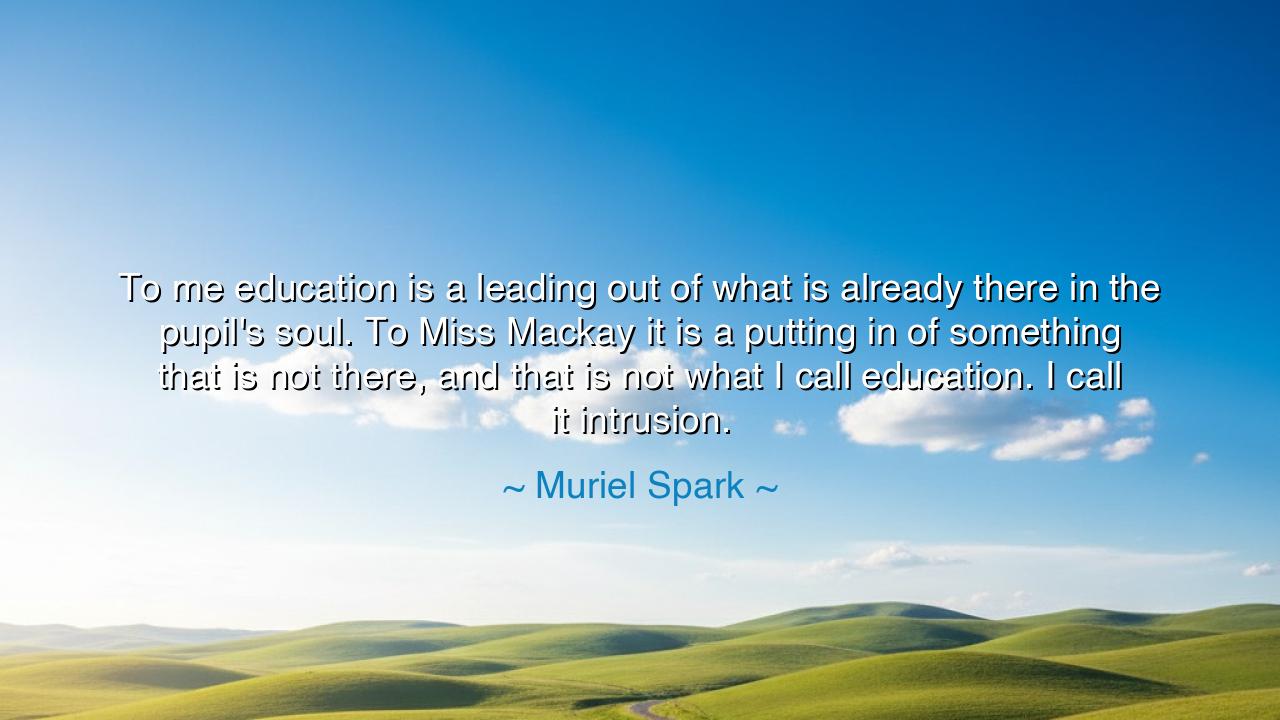
To me education is a leading out of what is already there in the
To me education is a leading out of what is already there in the pupil's soul. To Miss Mackay it is a putting in of something that is not there, and that is not what I call education. I call it intrusion.






"To me education is a leading out of what is already there in the pupil’s soul. To Miss Mackay it is a putting in of something that is not there, and that is not what I call education. I call it intrusion."
In this powerful statement, Muriel Spark, the celebrated Scottish novelist and author of The Prime of Miss Jean Brodie, reveals a profound conflict between two philosophies of education—one that awakens the inner spirit and one that suppresses it. Her words, placed in the mouth of the teacher Jean Brodie, speak to an eternal debate: whether teaching is about drawing out what lies within a person or forcing upon them what society deems important. Spark’s insight transforms a simple disagreement between educators into a reflection on freedom, individuality, and the soul’s natural hunger for truth.
In the ancient tongue of wisdom, Spark’s distinction echoes the Greek origin of the very word “education,” from educere, meaning “to lead out.” True education, as she describes it, is not the act of filling a vessel but of kindling a flame. It is the art of awakening a mind rather than burdening it. The teacher, in this vision, is not a master of knowledge but a midwife of the spirit, helping the student give birth to his own understanding. The soul, Spark reminds us, is not empty—it is a garden already planted by creation. The duty of education is to tend that garden, to water and nourish it, not to uproot and replace it.
In Jean Brodie’s world, however, this ideal meets opposition in the form of Miss Mackay, a headmistress who represents the mechanical and authoritarian side of schooling. To her, education is “a putting in”—a rigid process of shaping the student according to external standards. Miss Mackay’s approach mirrors the industrial age’s obsession with conformity, with producing efficient workers rather than thoughtful souls. Spark uses this tension to expose how systems of learning can become systems of intrusion, violating the sanctity of the mind by replacing self-discovery with obedience. In Brodie’s defiance, we hear the cry of all great teachers who have fought to preserve the soul’s independence.
This contrast between “leading out” and “putting in” has appeared throughout history in every age of enlightenment and every struggle against oppression. In the 19th century, Rabindranath Tagore of India built schools based on the same principle—where students learned in nature, freely, led by curiosity rather than command. In the 20th century, Maria Montessori echoed this when she said, “The greatest sign of success for a teacher is to be able to say, ‘The children are now working as if I did not exist.’” Like Spark’s Jean Brodie, they believed that education must liberate, not dominate—that knowledge should emerge from within, not be forced from without.
There is, however, a subtle warning within Spark’s insight. The same passion that seeks to “lead out” the soul can become dangerous if it becomes ego-driven. Jean Brodie, though inspired by noble ideals, ultimately fails because she confuses guidance with control, mistaking her influence for divine right. Thus Spark’s wisdom is twofold: she honors the power of education to free the soul, yet cautions against the teacher who becomes the architect of another’s destiny. The true educator must possess humility, knowing when to guide and when to step aside—when to speak and when to listen.
In every generation, societies face the same choice: to raise individuals who think for themselves, or to manufacture those who think as they are told. Spark’s words remind us that the heart of education is not information, but formation—not the filling of the mind, but the awakening of conscience and imagination. When teaching becomes intrusion, it stifles creativity and dulls the fire of wonder; but when it becomes invitation, it gives rise to wisdom, courage, and compassion. The difference is not in the lesson, but in the spirit in which it is given.
So let this be the lesson carried to all who teach and all who learn: do not treat the soul as clay to be molded, but as a flame to be fanned. Seek to draw out, not to dominate; to awaken, not to impose. Every pupil carries within them a light, however dim, that waits to be discovered. The task of the teacher—and indeed, of all who influence others—is to lead that light into its fullness. For as Muriel Spark so beautifully reminds us, when education ceases to be liberation and becomes intrusion, it no longer nurtures life—it suffocates it. True education, therefore, is not the making of minds, but the unfolding of souls.






AAdministratorAdministrator
Welcome, honored guests. Please leave a comment, we will respond soon